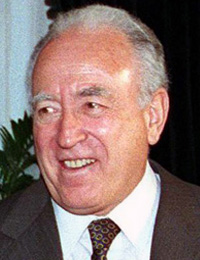
Eduardo Nicanor Frei Montalva was a Chilean political leader. In his long political career, he was Minister of Public Works, president of his Christian Democratic Party, senator, President of the Senate, and the 27th president of Chile from 1964 to 1970. His eldest son, Eduardo Frei Ruiz-Tagle, also became president of Chile (1994–2000).

Puerto Montt is a port city and commune in southern Chile, located at the northern end of the Reloncaví Sound in the Llanquihue Province, Los Lagos Region, 1,055 km to the south of the capital, Santiago. The commune spans an area of 1,673 km2 (646 sq mi) and has a population of 245,902 in 2017. It is bounded by the communes of Puerto Varas to the north, Cochamó to the east and southeast, Calbuco to the southwest and Maullín and Los Muermos to the west.

The Revolutionary Left Movement is a Chilean far-left Marxist-Leninist communist party and former urban guerrilla organization founded on 12 October 1965. At its height in 1973, the MIR numbered about 10,000 members and associates. The group emerged from various student organizations, mainly from University of Concepción, that had originally been active in the youth organization of the Socialist Party. They established a base of support among the trade unions and shantytowns of Concepción, Santiago, and other cities. Andrés Pascal Allende, a nephew of Salvador Allende, president of Chile from 1970 to 1973, was one of its early leaders. Miguel Enríquez was the General Secretary of the party from 1967 until his assassination in 1974 by the DINA.

The Seguro Obrero massacre occurred on September 5, 1938, and was the Chilean government's response to an attempted coup d'état by the National Socialist Movement of Chile (MNSCh), whose members were known at the time as Nacistas ("Nazis"), with some differences that justified their option for a different name. After a failed coup involving a stand-off and a shootout, in which one Nacista and one police officer was killed, 59 Nacistas who had surrendered after being given assurances of not being harmed, were summarily executed, allegedly under the orders of President Arturo Alessandri.

Curicó Unido is a football club based in Curicó, Maule Region, Chile. They currently play in the Primera B de Chile, the second level of the Chilean football system. They are currently managed by Miguel Riffo.

Pongo en tus manos abiertas is the fourth studio album by Chilean singer-songwriter Víctor Jara, released in June 1969. It was the third release of the Jota Jota record label, created by the Communist Youth of Chile to publish recordings by artists of the Nueva canción chilena such as Quilapayún, who collaborated in the musical accompaniment of some songs.

On 11 March 1990, Chile transitioned to a democracy, ending the military regime led by General Augusto Pinochet. This transition lasted 15 years. Unlike most democratic transitions led by either the elite or the people, this democratic transition process is known as an intermediate transition – a transition involving both the regime and the civil society. Throughout the transition, as the regime increased repressive violence, it simultaneously supported liberalization – progressively strengthening democratic institutions and gradually weakening that of the military.

Edmundo Pérez Zujovic was a Chilean businessman and politician, militant of the Christian Democratic Party (PDC). He served as Minister of State during the government of president Eduardo Frei Montalva, in the administration he led the Public Works and Interior portfolios.

Edmundo Jaime Pérez Yoma is a Chilean politician from the Christian Democrat Party of Chile. He was twice the Minister of Defense during the administration of President Eduardo Frei Ruiz-Tagle, and he served as the Minister of the Interior for President Michelle Bachelet's administration.
Following the 1973 Chilean coup d'état, an armed leftist resistance movement against Augusto Pinochet's dictatorship developed until 1990 when democracy was restored. This conflict was part of the South American theater in the Cold War, with the United States backing the Chilean military and the Soviet Union backing the guerrillas. The main armed resistance groups of the period were the Revolutionary Left Movement (MIR) and Frente Patriótico Manuel Rodríguez (FPMR), the armed wing of the Communist Party. These groups had a long-standing rivalry, including over Marxist orthodoxy and its implementation.
The following lists events that happened during 1965 in Chile.
The following lists events that happened during 1967 in Chile.
The following lists events that happened during 1969 in Chile.
The following lists events that happened during 1971 in Chile.
The following lists events that happened during 1972 in Chile.
The following lists events that happened during 1982 in Chile.

Squatting in Chile is the occupation of unused land or derelict buildings without the permission of the owner. From the 1960s onwards, informal settlements known as callampas were permitted although there were also evictions such as the massacre of Puerto Montt in 1969. In the 1970s, the government of Salvador Allende encouraged occupations, then following the coup d'état, the military junta repressed squatting. Callampas then became known as campamentos.









